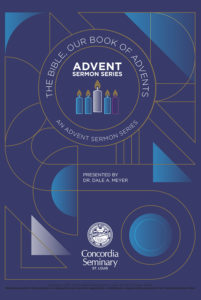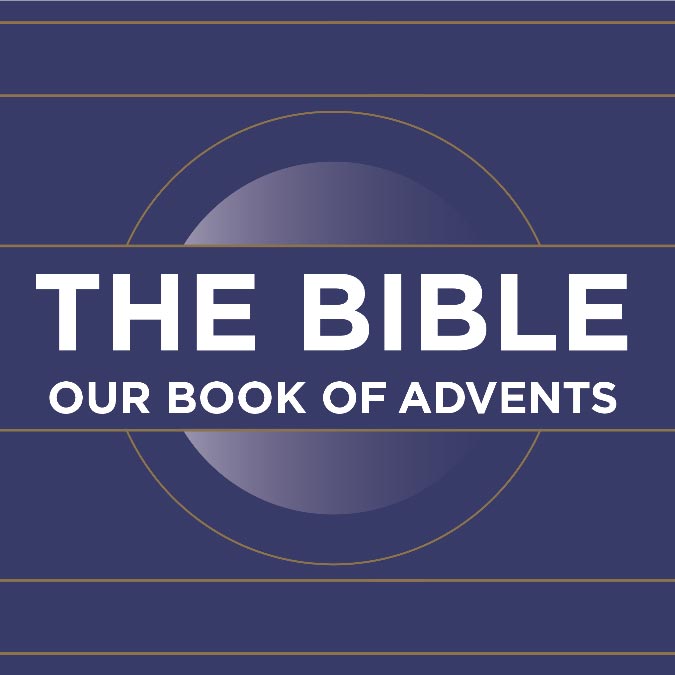 Finding Christ in the Old Testament is the focus of the new Advent Sermon Series, The Bible, Our Book of Advents, written by President Emeritus Dr. Dale A. Meyer and published by Concordia Seminary Press. Available as a downloadable PDF, the series includes four sermons drawing from Old Testament texts that prefigure the advents of Christ. After each sermon, a “Supplemental Thought” section provides suggested hymns, Scripture and prayers.
Finding Christ in the Old Testament is the focus of the new Advent Sermon Series, The Bible, Our Book of Advents, written by President Emeritus Dr. Dale A. Meyer and published by Concordia Seminary Press. Available as a downloadable PDF, the series includes four sermons drawing from Old Testament texts that prefigure the advents of Christ. After each sermon, a “Supplemental Thought” section provides suggested hymns, Scripture and prayers.
The following is from the Introduction:
Forty-eight Advents after graduating from Seminary, traditional treatment of Advent themes seems trite. No question about these themes, Christ’s incarnation, the Means of Grace, and Parousia, are of the essence of our Christian faith but their presentation has become, at least to me, well worn, “trite” from tritus, the participle of terere, to rub. True Advent challenges us, but there is much in our surrounding culture that subtly wears down messages of Christ’s advents. One factor is omnipresent media and commerce that so focus society, parishioners included, on Christmas and gift giving that Advent gets reduced to getting ready to celebrate the birth of baby Jesus. Faithful people keep reminding us “Jesus is the reason for the season,” true enough, but Jesus has other seasons, now and coming, which easily get drowned out by societal noise.
Another factor wearing down the impact of our Advent preaching is the compartmentalization of Western culture. In The Bondage Breaker, Neil T. Anderson says Western culture has a two-tier worldview: The transcendent world of God and spiritual forces (religion) and the empirical world of senses (science).1 The majority world mingles the two, but Western culture keeps them separate. Hence, religion is compartmentalized to Sunday and church. So Christ’s advent in the incarnation is past history, the Means of Grace compartmentalized to worship in church, and his final Advent is so far off, it’s not relevant to daily life. These and other deceptions of our surrounding culture can make us become “atheists unawares,” as Os Guinness puts it.
In short, the modern world quite literally “manages” without God. We can do so much so well by ourselves that there is no need for God, even in his church. Thus we modern people can be profoundly secular in the midst of explicitly religious activities. Which explains why so many modern Christian believers are atheists unawares. Professing to believe in supernatural realities, they are virtual atheists; whatever they say they believe, they show in practice that they function without practical recourse to the supernatural. … The call to follow Jesus Christ runs directly counter to this deadly modern pressure toward secularization.”2
In an obviously imperfect attempt to reenergize the traditional and true themes of Advent and to try to raise awareness of God’s comings and saving presence in every day of life, I have turned to four familiar Old Testament texts as prefigurations of the advents of Christ. The Enlightenment beguiled us into studying Old Testament texts in their historical context, which is a true exegetical task, sensus literalis, but there is more than the original setting. The Scriptures being the Scriptures of the church, we also want to understand Old Testament texts in the light of Christ. Novum testamentum in vetere latet; vetus testamentum in novo patet.
Robert D. Preus: “Following Luther, the theologians of Lutheran orthodoxy make Christ the central theme of all Scripture. … This conviction of all the orthodox Lutherans that the Christocentricity of Scripture is a hermeneutic principle dovetails perfectly with their belief that the theology of Scripture is one unified Christian theology, with their strong and consistent christological exegesis of the Old Testament, with their emphasis on the analogy of faith as a hermeneutical norm, and with their understanding that all Scripture is Law or Gospel. But what is of higher significance is that the Christocentricity of Scripture unites the formal (sola Scriptura) principle of theology with the material principle (justification through faith in Christ) in such a way that neither stands alone, but each complements the other perfectly. The Sacred Scriptures, which are the norm of doctrine, are the Scriptures that declare Christ throughout….
“To be sure, there is a vast difference between the Old and New Testament Scriptures in their presentation of doctrine; there is a definite unfolding and advance in clarity as well as phraseology and thought. The Old Testament Scriptures present the doctrine under different circumstances and different times; in the Old Testament Christ is prefigured under shadows and types as something to come. But substantially the theology of Scripture is one, even as Christ is one. Tempora variata sunt, non fides.3
Martin Luther: “What Moses wrote concerning the patriarchs he did not write primarily for their sakes. They had no need at all of these writings; they were already dead and gathered to their fathers. No, Moses wrote in order that the churches might be instructed and strengthened up to the end of the world.”4
No effort has been made to coordinate these sermons with the appointed lessons for Advent. Depending upon your style of delivery, you may find the manuscripts a bit long. Obviously the most desirable use of these sermons is to think through and adapt the content and rhetoric to your own style and pastoral needs.
Finally, Advent is about anticipation, less of the manger and more about the final revelation of Christ when he leads his ransomed to the inheritance reserved in heaven. Phillips Brooks describes what I pray we will with God’s Spirit accomplish this Advent.
Such men in our community, in our family circles, in our own little groups, whatever they are, any of us may be—men who shall do something to hold the soul of our little group in such expectancy and readiness, in such unwillingness to settle down upon the imperfect present as a finality, that when the inspired word or deed shall come, as it is sure to come some time, it shall find the atmosphere ready to receive it and transmit it.”5
Perhaps some parishioner might ask, “Where else in the Old Testament can we find Christ?” Wouldn’t that be great?
-
-
- Neil T. Anderson, The Bondage Breaker: Overcoming Negative Thoughts, Irrational Feelings, Habitual Sins (Eugene, OR: Harvest House, 2019).
- Os Guinness, The Call: Finding and Fulfilling the Central Purpose of Your Life (Nashville: Thomas Nelson, 2003), 149.
- Robert Preus, The Theology of Post-Reformation Lutheranism, vol. 2 (St. Louis: Concordia Publishing House, 1972), 331–332.
- Martin Luther, Luther’s Works, American Edition, vols. 1–30, ed. Jaroslav Pelikan (St. Louis: Concordia Publishing House, 1955–1976), 5:223–224.
- Phillips Brooks in For All the Saints, ed. Frederick J. Schumacher (Delhi, NY: American Lutheran Publicity Bureau, 1996), vol. 4, 445.
-


Leave a Reply
You must be logged in to post a comment.